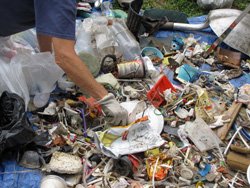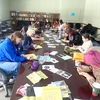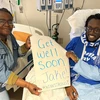SUNY Fredonia’s volunteer impact throughout Chautauqua County is well known, with approximately 13,000 student volunteer hours contributed annually. Now, thanks to the creation of the Fredonia Academic Community Engagement (FACE) Center, traditional volunteering at SUNY Fredonia is poised to evolve into more strategic, long-lasting and meaningful experiences for both students and community members alike.
University officials are so excited about the FACE Center’s potential to richly benefit students and the region that President Dennis Hefner identified it among 10 high-profile achievements in his January “All-campus Address.”Civic engagement, sustainability, service learning and community-based research are the four pillars that comprise the FACE Center, whose overall mission is to promote greater collaboration between the campus and community. Pooling them under the new FACE Center banner strengthens their interconnectedness without compromising the ability of each to make specific contributions that respond to specific needs.
Four veteran faculty members — Political Science Chair David Rankin, English Professors Christina Jarvis and Emily Van Dette, and Chemistry Professor Sherri Mason — have been enlisted to manage the FACE Center in its initial year. Each brings his/her own expertise to the organization, yet they all share a common passion to strengthen the campus-community network. With more than 30 years of combined teaching experience at SUNY Fredonia alone, the quartet knows the university and the region well.
In past years, individual professors have incorporated certain service learning components into their coursework. Numerous faculty members conduct meaningful research in the surrounding community. Campus-wide activities such as Earth Week and youth voter mobilization have been notable successes with significant student involvement and leadership. But there was never any formal structure to align all four initiatives, explained Vice President for Academic Affairs Virginia Horvath.
“It was never coordinated on a large scale. We have never had them as part of the umbrella of activities that we do now,” Dr. Horvath explained. “Even though we’ve had a lot of good connections with the community, we never had the infrastructure to support this.”
According to Dr. Rankin, the FACE Center director, “SUNY Fredonia students will benefit from the knowledge and expertise gained through service learning, internship possibilities, and related projects and activities, while contributing to meaningful campus community partnerships on identified needs and concerns.”
He added, “I believe that there is incredible potential for SUNY Fredonia and the surrounding area with regard to campus-community partnerships. There are numerous opportunities for learning, research, projects and activities in-line with community needs and interest.”
Moreover, genuine interest and commitment exists throughout the college and region to strengthen collaboration on meaningful projects that provide significant learning possibilities while addressing community concerns and solutions.
Most FACE initiatives will be arranged so students can earn academic credit. For example, students in Rankin’s “Media and Politics” course this semester have the opportunity to earn a fourth credit as part of a service learning project with the Chautauqua County League of Women Voters. Local internship possibilities with civic organizations and institutions will be further developed to complement existing internships in Albany and Washington.
 Events such as the Point Gratiot Beach Clean-up stand to become even more successful with the extra guidance and resources of the new FACE Center. |
The civic engagement pillar of FACE seeks to develop and apply knowledge and skills through political and non-political processes by active citizens contributing to the community and civic life. Rankin is charged with developing and facilitating discourse and awareness on critical issues through the use of campus community forums, events and activities that encourage civic dialogue and action.
The goal of the sustainability component, which dovetails with the campus “Go Green” initiative, is to unite community interests, expertise and needs with campus resources to support local sustainability projects. Dr. Jarvis, a co-founder of the Sustainability Committee and chair of 2009’s Earth Week, oversees this area.
“It’s really a dream position for me, and it allows me to devote more time to sustainability projects both on and off campus,” she said.
Jarvis’ new duties include identifying regional partners and connecting them with students and classes, working with environmental groups on joint programming, organizing campus-community events, integrating sustainability topics into course curricula, and working with the FACE Center and grants office to obtain funding.
“The goal of service learning or any FACE collaboration is for both students and community to benefit. Community partners have special areas of expertise and real-world skills that they can share with students, and students can bring a tremendous amount of energy, passion, and specific disciplinary expertise that they can share with partners,” she added.
Dr. Mason, coordinator of community-based research, believes the FACE mission embodies what she views as the next level of her role as an educator. She wants to go beyond teaching the basics or tools of a singular discipline to also address the “interconnectedness of the whole” and show students how to put those tools into action.
Through Mason’s efforts, the FACE Center is working with the Sustainability Committee, which hosted the first campus-wide Earth Week series of events two years ago, to take community engagement and educational outreach activities to a new level during Earth Week 2010. These include the first-ever Chautauqua County Green Expo to promote recycling and conservation efforts and “Shake the Habit,” an event that asks all retailers in the Dunkirk/Fredonia area to go one full day without using plastic bags on April 22, the 40th anniversary of Earth Day.
Many faculty members are already engaged in community-based research, but there is no coherent organization or database of that work, Mason explained. Her initial goal was to create a structure, framework and organization for that research. With that done, she will focus on the greater dissemination of community-based research results to the community, the creation of relationships between faculty and community partners, and funding opportunities to support these partnerships.
As the service learning coordinator, Dr. Van Dette facilitates the integration of community involvement with academic work. There is great potential, she believes, for the mutual benefit of classrooms and the local community. Service learning integrates course instruction with community service to spur civic learning and responsibility, enrich academic pursuit and connect the campus and community.
“I’ve noticed that my students seek out and value ‘real-world’ experiences, and integrating community involvement and service is one important way to provide those crucial, authentic learning experiences,” said Van Dette, who is also a SUNY Fredonia alumna (Class of ’98) and brings the added perspective of what it’s like being a student on this campus.
In a service learning course, students’ knowledge, critical awareness and skills are enhanced by meaningful and relevant opportunities that serve the local community, she explained. And by collaborating with “real-world” experts, professionals and community leaders, students learn valuable communication, civic and professional skills that go beyond traditional classroom learning.
Recent examples of FACE Center collaboration with campus and community partners include the public screening of the film “Addicted to Plastic” involving a discussion of Point Gratiot Beach cleanups at the Grange Hall; a “Meet the Candidates” Town Hall Forum at the Opera House; and “Integrating Sustainability Topics and Assignments into Your Spring Courses: an Interactive Workshop” at Fenton Hall.
The FACE Center will place SUNY Fredonia, classified by the Carnegie Foundation as a comprehensive university because it grants master’s degrees, in the position to begin discussions that explore the addition of the Community Engagement elective classification that recognizes collaboration between universities and their surrounding communities.



